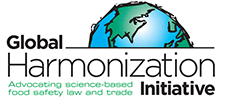Chile
Ambassadors

Prof. Dr. Franco Pedreschi
Professor. Head of the Department of Chemical Engineering and Bioprocess PUC
Pontificia Universidad Católica de Chile (PUC)

Dr. María Salomé Mariotti Celis
Researcher
Programa Institucional de Fomento a la Investigación,
Desarrollo e Innovación
Universidad Tecnológica Metropolitana
Ambassador’s Report
Prof. Dr. Franco Pedreschi:
My goals as a GHI Ambassador will be: (i) Raise main issues in Chile food safety needed to integrate to GHI; (ii) Disseminate main advances in food safety in Chile regarding to GHI in different conferences abroad; (iii) Incorporate the main actors in Chilean food industry to be aligned with the GHI; and (iv) Incorporate the Chilean Agency of Food Safety and Quality in the communication with GHI though the Ambassador.
My first goal as ambassador of Global Harmonization Initiative (GHI) is to connect food market stakeholders and try to convince local authorities (mainly represented by the Chilean Agency of Food Safety and Quality) and food chain actors that harmonization is nowadays a main issue of interest for everybody.
In this sense, not only large companies are affected by unjustified differences in food regulations, but also small companies and street vendors and ultimately all consumers, who in many countries have a democratic vote and thus are influential. It is quite urgent that the science should e translated into a language that those who need to know understand in order to standardize all around the world the codes by which different food products are traded among different countries.
As a result of the implementation of GHI in Chile, food commerce and trade will increase and the cases of ETAs by food commerce will decrease gradually.
Dr. María Salomé Mariotti Celis:
My goals as a GHI Ambassador will be: (i) Contribute to assessment of main issues of Chilean safety and nutrition reality regarding to GHI; (ii) Communicate the main Chilean safety and nutrition changes on regulation to GHI community in order to establish a feedback of information and opinions; (iii) Disseminate the Chilean main advances in food safety and nutrition regarding to GHI in different conferences abroad; (iii) Incorporate the main actors of Chilean academy and government (Ministerio de Salud) to be aligned with the GHI.
My first goal as ambassador of GHI is to collect the Chilean information related to food safety and nutrition and subsequently analyze it, following the criteria of GHI.
Then, based on this analysis I will incorporate the harmonization approach to the Chilean food science and technology community including not only the academy but also some authorities as well as food industry.
The transfer of information and opinions between Chile and the GHI community will contribute to the development of new food safety and nutrition regulations which improve the life quality of Chilean population.
Presentations
Prof. Dr. Franco Pedreschi:
Stuttgart, Germany, 3-5 July 2018. The 5th International ISEKI Food Conference. Extraction of phenolic compounds from tara pods (Caesalpinia spinosa): effect of process parameters on extraction performance.Florencia Morales, Francisca Guajardo, Franco Pedreschi, María S. Mariotti, Rommy N. Zuñiga.
Amsterdam, Netherlands, 26-27 July 2018. European Food Chemistry Congress. Extract of Phenolic compounds obtained from tara (Caesalpinia spinosa) pods can mitigate neo-contaminant formation of Chilean bread without affecting its sensory attributes.Franco Pedreschi, Ilse Saavedra, Andrea Bunger, Rommy N. Zuñiga, Romina Pedreschi, Rosana Chirinos, David Campos, María Salomé Mariotti-Celis.
Capadoccia, Turkey, 10-12 October 2018. The 3rd International Congress on Food Technology. Effect of blanching and the type of frying on acrylamide and furan formation in potato chips. María Salomé Mariotti; Kit Granby; Franco Pedreschi.
Dr. María Salomé Mariotti Celis:
Mazatlán, Mexico, 20-22 June 2018. 3rd International Congress of Functional Foods and Nutraceutical. Obtaining safe polyphenol extracts from Carmenere grape pomace using glycerol as an alternative co-solvent. Huamán-Castilla N; Pedreschi F, Pérez-Correa JR; Mariotti-Celis MS*
Stuttgart, Germany, 3-5 July 2018. The 5th International ISEKI Food Conference. Extraction of phenolic compounds from tara pods (Caesalpinia spinosa): effect of process parameters on extraction performance. Florencia Morales, Francisca Guajardo, Franco Pedreschi, María Salomé Mariotti-Celis, Rommy N. Zuñiga
Amsterdam, Netherlands, 26-27 July 2018. European Food Chemistry Congress. Extract of Phenolic compounds obtained from tara (Caesalpinia spinosa) pods can mitigate neo-contaminant formation of Chilean bread without affecting its sensory attributes.Franco Pedreschi, Ilse Saavedra, Andrea Bunger, Rommy N. Zuñiga, Romina Pedreschi, Rosana Chirinos, David Campos, María Salomé Mariotti-Celis
La Serena, Chile. 3-6 October 2018. XXII Nutrition Conference. Is it possible to develop safe and healthier thermally treated dairy products? Ruíz C, Zúñiga R, Pedreschi F, Mariotti-Celis MS
•Capadoccia, Turkey, 10-12 October 2018. The 3rd International Congress on Food Technology. Effect of blanching and the type of frying on acrylamide and furan formation in potato chips. María Salomé Mariotti; Kit Granby; Franco Pedreschi
Publications
Prof. Dr. Franco Pedreschi:
Franco Pedreschi, Salomé Mariotti & Kit Granby (2014). Current issues in dietary acrylamide: formation, mitigation and risk formation. Journal of the Science of Food and Agriculture, 94(1), 9-20. https://doi.org/10.1002/jsfa.6349
Dr. María Salomé Mariotti Celis:
Mariotti, M. Granby, K. Rosowski, J. Fromberg, A. Toledo, C. Hevia, K., Gómez, J.P and Pedreschi, F. (2013). Are Chilean exposed to dietary furan? Food Additives and contaminants. doi:10.1080/19440049.2013.815807
Mariotti, M.; Granby, K.; Rosowski, J. and Pedreschi, F. (2013). Furan: a critical heat induced dietary contaminant. Food and Function. http://pubs.rsc.org/en/content/articlepdf/2013/fo/c3fo30375f
Franco Pedreschi, Salomé Mariotti & Kit Granby (2014). Current issues in dietary acrylamide: formation, mitigation and risk formation. Journal of the Science of Food and Agriculture, 94(1), 9-20. https://doi.org/10.1002/jsfa.6349
